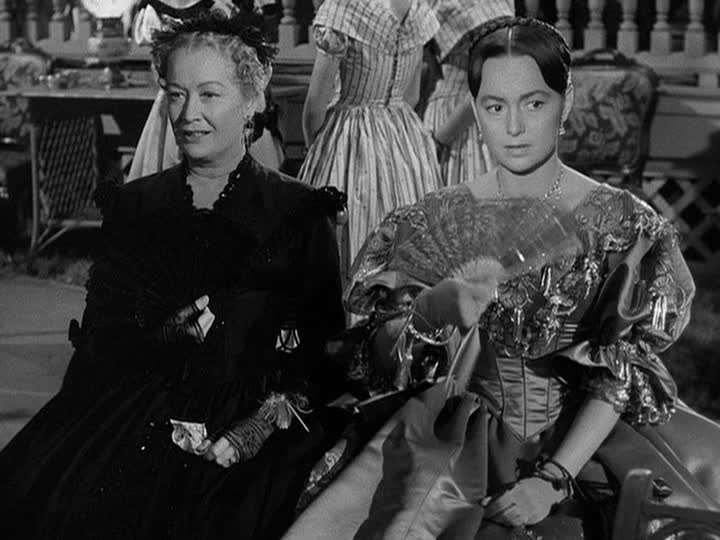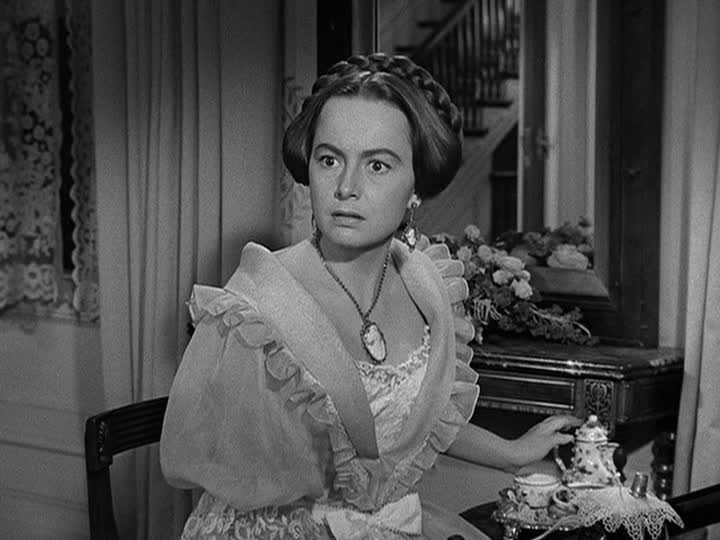Olivia @ 100: The Heiress
 Friday, June 24, 2016 at 7:30PM
Friday, June 24, 2016 at 7:30PM We're counting down to Olivia de Havilland's historic 100th birthday (July 1st!). Team Experience will be looking at highlights and curiosities from her career. Here's Tim...
Olivia de Havilland is more than a living link to the Golden Age of Hollywood, more than a gorgeous movie star, more than a two-time Oscar winner. She's one of the most significant figures in the history of the American film industry: the woman who broke the back of the studio contract system when she successfully sued Warner Bros. for career independence in 1943. As Hollywood's first independent movie star since the silent era, de Havilland was suddenly in a position to make all of her own creative decisions, leading to a string of challenging dramatic roles that didn't simply trade on her good looks and holy innocent persona.

Both of de Havilland's Oscar wins came about thanks to this period of chasing her own projects, and the second of these performances, in 1949's The Heiress, is a particularly fine example of the movie star as Serious Actress. Based on a play adapted from a Henry James novel, The Heiress tells a straightforward enough melodrama: in 1840s New York, a woman with an annual income of $10,000 from her mother's will and another $30,000 to come when her father passes. A painfully shy, relatively homely women crawling up in years, she falls for the first man who pays her any attention, and he of course turns out to be a craven gold-digger. When her father threatens her with disinheritance the cad leaves, giving her plenty of years to grow good and bitter.
What enlivens this material is, in large part, the exemplary casting of the four main characters: de Havilland as the naïve heiress, Ralph Richardson as her father, Montgomery Clift as her shiftless lover, and Miriam Hopkins as her spinster aunt, unhelpfully projecting her own romantic visions onto the young lady. That's a lot of acting power, and having such great scene partners helped to raise de Havilland's own game, allowing her to have more complicated, and much darker, reactions that most of what she'd been able to achieve in the years prior to that.
She's great at playing a wallflower, in the second film in two years (following The Snake Pit) where she de-glammed herself for Art and Oscars. De Havilland can only look so ugly, even with the hair and make-up department raising her hairline almost to the top of her head, but the actress sells herself as a plain, awkward frump by constantly shrinking herself inwards, hunching down, delivering all of her lines a little bit too quietly and with nervous pauses. But she's even better in the last third of the movie, when she's playing the cold fury of a scorned romantic: there's a deep revulsion burned into her eyes and voice, giving the material its necessarily outraged finale. Without her fury, The Heiress is a handsome soap opera; with her, it becomes a dark tragedy.

For a performer who'll always forever be linked with the fairytale saint Melanie from Gone with the Wind, the haggard look on de Havilland's face and the raw pain in her voice are uniquely shocking and potent. It's as self-effacing as any star turn in the 1940s, and it's an achievement that could only come about in the brave new era of self-directed acting careers that de Havilland herself helped to create.

Previously: The Dark Mirror (1946), The Adventures of Robin Hood (1938) and It's Love I'm After (1937)



Reader Comments (8)
The ending to The Heiress is one of the all time great cinematic moments and it's largely down to her. Whoa.
Yes, I can be very cruel. I have been taught my masters.
That line delivered by her is so paradoxical, causing the audience to cheer and be terrified at the same time. Only a great can make that happen and Olivia nails it.
Olivia deserved an extra honourary Oscar for suing and breaking the 7 year contract system the studios had evolved. Naturally she also deserved the other acting Oscars she won, especially for "The Heiress". It's full of wonderful subtle touches, and the power of that performance cannot be denied.
A great lady, and a great actress, this tribute is really well deserved.
In my opinion this is one of the best acting wins in the history of the award. She hits all the notes perfectly at the proper time using her whole physicality consistently throughout the film to illustrate Catherine's inner life and the changes she experiences and endures.
Olivia's very good in To Each His Own elevating that material which is pretty standard to a higher level but in this handed superior material and with a master craftsman at the helm she's simply staggering.
Agreed that the other three main performers surrounding her help her maintain the high level of performance, funny since she, Richardson and Clift didn't exactly hit it off behind the scenes. In addition to them I think Selena Royale's casting as Richardson & Hopkins other sister Elizabeth is spot on, with her in the mix the three really seem like they could be siblings. Though her role is small it's key in many ways and one of my favorite scenes in the film is the hurried conference between the trio just before Dr, Sloper goes in to reject Clift's request for Catherine's hand in marriage. I has a very true feeling to the dynamic.
It's too bad for her career that having hit this peak she decided to step away to focus on her family and only make films sporadically though I doubt she regrets it. But outside of My Cousin Rachel which followed this three years later her pictures from this point on are a very mixed bag.
Love that film and that performance.
May I disagree? I really don't like this performance. Gimmicky, artificial, calculated, coasting on her supposed bad looks, the classic deglam performance. She's so irritating here that I get the feeling she's unsuccessfully trying to embody this "ugly" woman that this becomes her only emotion. Every other emotion she tries come from her make-up and hairline. This discomfort is not the part; it's De Havilland trying to access a character from the outside and, like her masters, defining the character by her looks.
For me, this is one of the great performances ever. Emotionally, she nails it in every scene as she takes this character across an arc that every actor dreams of getting in a role. She modulates her voice and adapts her posture and carriage to match the internal development of Catherine as well.
I'd love to know the results of the Oscar voting for 1949. Given that she had lost the year before for her incredible work in the groundbreaking The Snake Pit, and taking into consideration the relative weakness of her competition, her Oscar victory must have been one of the bigger blowouts in the Best Actress category!
this is my fave performance from Olivia.
And who also didn't know that dance cards were a literal thing before watching this? Just me? OK.